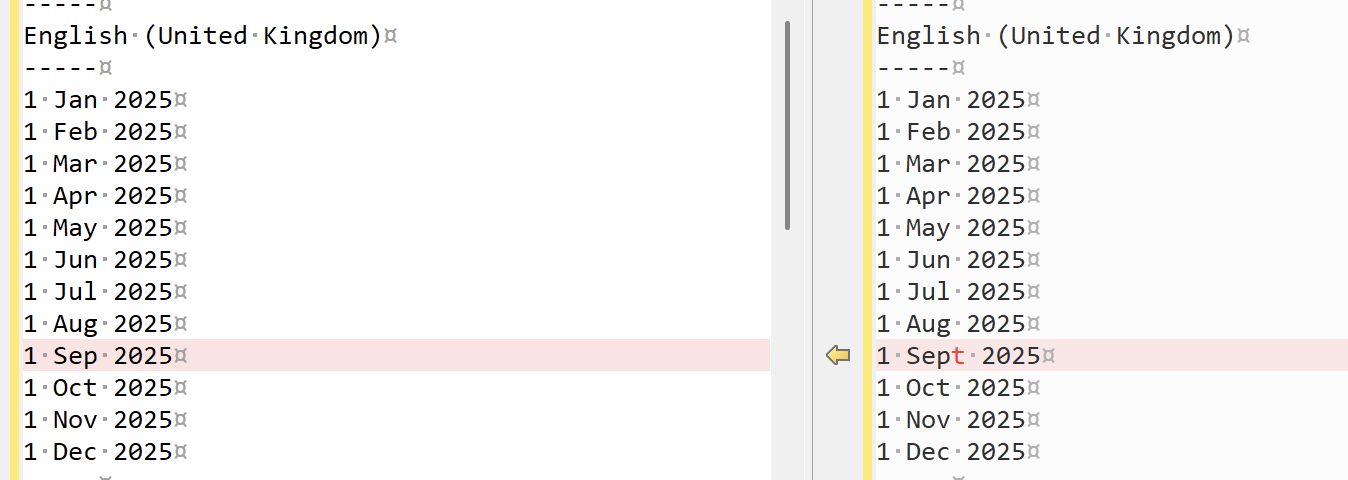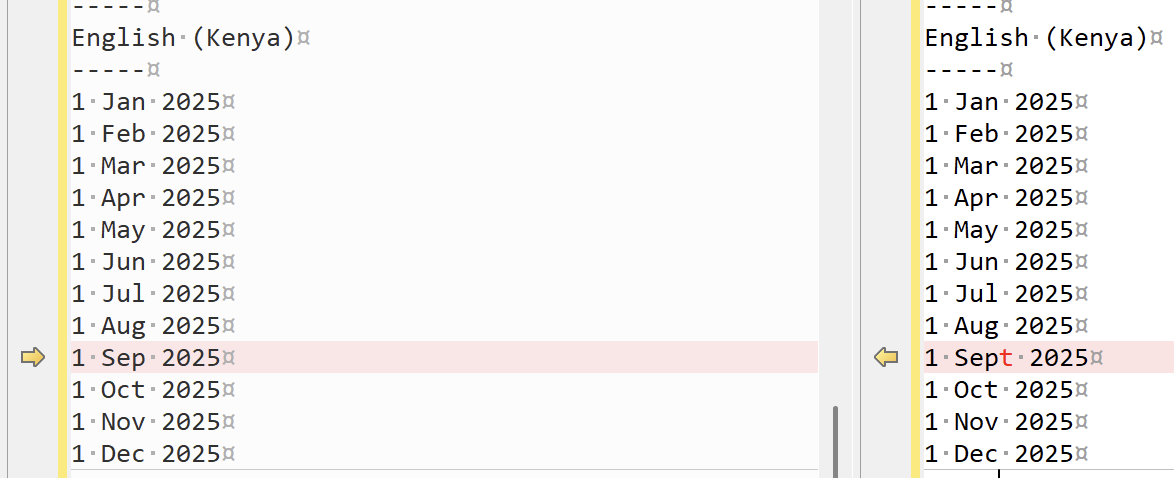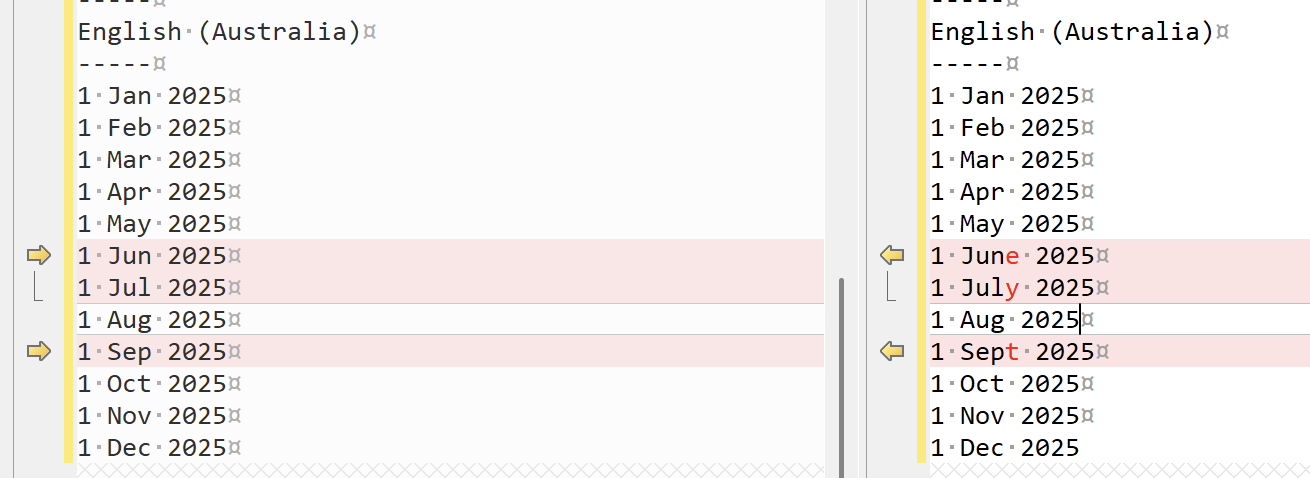Sep Is The Short Date Format For September. Sometimes
[C#, .NET, Localization]
We have discussed dates, localization, and regional considerations in past posts.
Today, we will discuss a gotcha that my team encountered this month.
When it comes to formatting dates, we utilize format strings.
The format string for months (short) is MMM.
Most people considerMMM to mean the month names in three characters.
This is not the correct interpretation. Consider MMM as the short form of the month name, which may or may not be three characters.
Let us take a look at some examples in various locales to illustrate.
My environment (OS & .NET version), I can retrieve as follows:
dotnet --info
Which yields:
.NET SDK:
Version: 10.0.100-preview.7.25380.108
Commit: 30000d883e
Workload version: 10.0.100-manifests.70c080cd
MSBuild version: 17.15.0-preview-25380-108+30000d883
Runtime Environment:
OS Name: Mac OS X
OS Version: 15.6
OS Platform: Darwin
RID: osx-arm64
Base Path: /usr/local/share/dotnet/sdk/10.0.100-preview.7.25380.108/
The code is as follows:
using System.Globalization;
// Define list of cultures we want to test
string[] cultureCodes = ["en-GB", "en-US", "fr-FR", "de-DE", "en-KE", "en-AU"];
// From each code, build the CultureInfo object (culture)
foreach (string code in cultureCodes)
{
var culture = new CultureInfo(code);
Console.WriteLine(new string('-', culture.Name.Length));
Console.WriteLine(culture.EnglishName);
Console.WriteLine(new string('-', culture.Name.Length));
// Print formatted dates
for (var i = 1; i <= 12; i++)
{
var date = new DateTime(2025, i, 1);
Console.WriteLine(string.Format(culture, "{0:d MMM yyyy}", date));
}
}
This will print the following on macOS:
-----
English (United Kingdom)
-----
1 Jan 2025
1 Feb 2025
1 Mar 2025
1 Apr 2025
1 May 2025
1 Jun 2025
1 Jul 2025
1 Aug 2025
1 Sep 2025
1 Oct 2025
1 Nov 2025
1 Dec 2025
-----
English (United States)
-----
1 Jan 2025
1 Feb 2025
1 Mar 2025
1 Apr 2025
1 May 2025
1 Jun 2025
1 Jul 2025
1 Aug 2025
1 Sep 2025
1 Oct 2025
1 Nov 2025
1 Dec 2025
-----
French (France)
-----
1 janv. 2025
1 févr. 2025
1 mars 2025
1 avr. 2025
1 mai 2025
1 juin 2025
1 juil. 2025
1 août 2025
1 sept. 2025
1 oct. 2025
1 nov. 2025
1 déc. 2025
-----
German (Germany)
-----
1 Jan. 2025
1 Feb. 2025
1 März 2025
1 Apr. 2025
1 Mai 2025
1 Juni 2025
1 Juli 2025
1 Aug. 2025
1 Sept. 2025
1 Okt. 2025
1 Nov. 2025
1 Dez. 2025
-----
English (Kenya)
-----
1 Jan 2025
1 Feb 2025
1 Mar 2025
1 Apr 2025
1 May 2025
1 Jun 2025
1 Jul 2025
1 Aug 2025
1 Sep 2025
1 Oct 2025
1 Nov 2025
1 Dec 2025
-----
English (Australia)
-----
1 Jan 2025
1 Feb 2025
1 Mar 2025
1 Apr 2025
1 May 2025
1 Jun 2025
1 Jul 2025
1 Aug 2025
1 Sep 2025
1 Oct 2025
1 Nov 2025
1 Dec 2025
The same code will print the following on Windows 11:
-----
English (United Kingdom)
-----
1 Jan 2025
1 Feb 2025
1 Mar 2025
1 Apr 2025
1 May 2025
1 Jun 2025
1 Jul 2025
1 Aug 2025
1 Sept 2025
1 Oct 2025
1 Nov 2025
1 Dec 2025
-----
English (United States)
-----
1 Jan 2025
1 Feb 2025
1 Mar 2025
1 Apr 2025
1 May 2025
1 Jun 2025
1 Jul 2025
1 Aug 2025
1 Sep 2025
1 Oct 2025
1 Nov 2025
1 Dec 2025
-----
French (France)
-----
1 janv. 2025
1 févr. 2025
1 mars 2025
1 avr. 2025
1 mai 2025
1 juin 2025
1 juil. 2025
1 août 2025
1 sept. 2025
1 oct. 2025
1 nov. 2025
1 déc. 2025
-----
German (Germany)
-----
1 Jan. 2025
1 Feb. 2025
1 März 2025
1 Apr. 2025
1 Mai 2025
1 Juni 2025
1 Juli 2025
1 Aug. 2025
1 Sept. 2025
1 Okt. 2025
1 Nov. 2025
1 Dez. 2025
-----
English (Kenya)
-----
1 Jan 2025
1 Feb 2025
1 Mar 2025
1 Apr 2025
1 May 2025
1 Jun 2025
1 Jul 2025
1 Aug 2025
1 Sept 2025
1 Oct 2025
1 Nov 2025
1 Dec 2025
-----
English (Australia)
-----
1 Jan 2025
1 Feb 2025
1 Mar 2025
1 Apr 2025
1 May 2025
1 June 2025
1 July 2025
1 Aug 2025
1 Sept 2025
1 Oct 2025
1 Nov 2025
1 Dec 2025
My environment on Windows is as follow:
.NET SDK:
Version: 10.0.100-rc.1.25451.107
Commit: 2db1f5ee2b
Workload version: 10.0.100-manifests.0e2d47c4
MSBuild version: 17.15.0-preview-25451-107+2db1f5ee2
Runtime Environment:
OS Name: Windows
OS Version: 10.0.26100
OS Platform: Windows
RID: win-arm64
Base Path: C:\Program Files\dotnet\sdk\10.0.100-rc.1.25451.107\
What is the difference?
English (UK)

English (Kenya)

English (Australia)

Interesting.
Let us rewrite the code for Java.
void main() {
String[] cultureCodes = {"en-GB", "en-US", "fr-FR", "de-DE", "en-KE", "en-AU"};
for (String code : cultureCodes) {
// Create locale from language + country
Locale locale = Locale.forLanguageTag(code);
// Print separators
String line = "-".repeat(code.length());
System.out.println(line);
System.out.println(locale.getDisplayName(Locale.ENGLISH));
System.out.println(line);
// Format months for the given locale
DateTimeFormatter formatter = DateTimeFormatter.ofPattern("d MMM yyyy", locale);
for (int i = 1; i <= 12; i++) {
LocalDate date = LocalDate.of(2025, i, 1);
System.out.println(date.format(formatter));
}
}
}
This returns the following:
-----
English (United Kingdom)
-----
1 Jan 2025
1 Feb 2025
1 Mar 2025
1 Apr 2025
1 May 2025
1 Jun 2025
1 Jul 2025
1 Aug 2025
1 Sept 2025
1 Oct 2025
1 Nov 2025
1 Dec 2025
-----
English (United States)
-----
1 Jan 2025
1 Feb 2025
1 Mar 2025
1 Apr 2025
1 May 2025
1 Jun 2025
1 Jul 2025
1 Aug 2025
1 Sep 2025
1 Oct 2025
1 Nov 2025
1 Dec 2025
-----
French (France)
-----
1 janv. 2025
1 févr. 2025
1 mars 2025
1 avr. 2025
1 mai 2025
1 juin 2025
1 juil. 2025
1 août 2025
1 sept. 2025
1 oct. 2025
1 nov. 2025
1 déc. 2025
-----
German (Germany)
-----
1 Jan. 2025
1 Feb. 2025
1 März 2025
1 Apr. 2025
1 Mai 2025
1 Juni 2025
1 Juli 2025
1 Aug. 2025
1 Sept. 2025
1 Okt. 2025
1 Nov. 2025
1 Dez. 2025
-----
English (Kenya)
-----
1 Jan 2025
1 Feb 2025
1 Mar 2025
1 Apr 2025
1 May 2025
1 Jun 2025
1 Jul 2025
1 Aug 2025
1 Sept 2025
1 Oct 2025
1 Nov 2025
1 Dec 2025
-----
English (Australia)
-----
1 Jan 2025
1 Feb 2025
1 Mar 2025
1 Apr 2025
1 May 2025
1 June 2025
1 July 2025
1 Aug 2025
1 Sept 2025
1 Oct 2025
1 Nov 2025
1 Dec 2025
This matches exactly with the output for Windows.
What about Linux?
For this, we run the .NET SDK image, which is based on Debian.
dotnet run -it mcr.microsoft.com/dotnet/nightly/sdk:10.0-preview
The environment info I retrieved as follows:
dotnet --info
Which returned the following:
.NET SDK:
Version: 10.0.100-rc.1.25425.114
Commit: bcd89f47fb
Workload version: 10.0.100-manifests.342a7967
MSBuild version: 17.15.0-preview-25425-114+bcd89f47f
Runtime Environment:
OS Name: ubuntu
OS Version: 24.04
OS Platform: Linux
RID: linux-arm64
Base Path: /usr/share/dotnet/sdk/10.0.100-rc.1.25425.114/
From within this container, we run the C# code above.
This prints the following:
-----
English (United Kingdom)
-----
1 Jan 2025
1 Feb 2025
1 Mar 2025
1 Apr 2025
1 May 2025
1 Jun 2025
1 Jul 2025
1 Aug 2025
1 Sept 2025
1 Oct 2025
1 Nov 2025
1 Dec 2025
-----
English (United States)
-----
1 Jan 2025
1 Feb 2025
1 Mar 2025
1 Apr 2025
1 May 2025
1 Jun 2025
1 Jul 2025
1 Aug 2025
1 Sep 2025
1 Oct 2025
1 Nov 2025
1 Dec 2025
-----
French (France)
-----
1 janv. 2025
1 févr. 2025
1 mars 2025
1 avr. 2025
1 mai 2025
1 juin 2025
1 juil. 2025
1 août 2025
1 sept. 2025
1 oct. 2025
1 nov. 2025
1 déc. 2025
-----
German (Germany)
-----
1 Jan. 2025
1 Feb. 2025
1 März 2025
1 Apr. 2025
1 Mai 2025
1 Juni 2025
1 Juli 2025
1 Aug. 2025
1 Sept. 2025
1 Okt. 2025
1 Nov. 2025
1 Dez. 2025
-----
English (Kenya)
-----
1 Jan 2025
1 Feb 2025
1 Mar 2025
1 Apr 2025
1 May 2025
1 Jun 2025
1 Jul 2025
1 Aug 2025
1 Sept 2025
1 Oct 2025
1 Nov 2025
1 Dec 2025
-----
English (Australia)
-----
1 Jan 2025
1 Feb 2025
1 Mar 2025
1 Apr 2025
1 May 2025
1 June 2025
1 July 2025
1 Aug 2025
1 Sept 2025
1 Oct 2025
1 Nov 2025
1 Dec 2025
Which is the same as Windows.
In conclusion, it would appear that the localization for the short month name in .NET is the same in Linux and Windows, but different on macOS.
I thought it was a macOS issue, but the fact that Java correctly returns the expected output indicates otherwise.
In the next post. we will examine why September is abbreviated as Sept.
TLDR
The short form of the month September is inconsistent across macOS, Linux, and Windows, and appears to be problematic on macOS.
The code is in my GitHub.
Happy hacking!